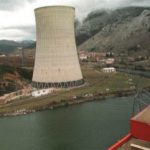Millions of people die prematurely of indoor pollution and other consequences of energy poverty. Centralized power systems have failed them, writes Jatin Nathwani of the University of Waterloo. But there is a way to empower the powerless: with microgrids and decentralized technologies. Courtesy The Conversation. … [Read more...]
Rapid wind and solar cost declines keep pushing fossil fuels out. How far can they go?
Rapid cost declines made renewable energy the United States’ cheapest available source of new electricity, without subsidies, in 2017, writes Silvio Marcacci of think tank Energy Innovation. In many parts of the U.S., building new wind is cheaper than running existing coal, while nuclear and natural gas aren’t far behind, notes Marcacci. As renewable energy costs continue their relentless decline, they keep pushing fossil fuels further from … [Read more...]
Nuclear power in crisis: we are entering the Era of Nuclear Decommissioning
Nuclear power is in crisis ‒ as even the most strident nuclear enthusiasts acknowledge ‒ and it is likely that a new era is fast emerging, writes Jim Green, editor of the Nuclear Monitor newsletter. After a growth spurt from the 1960s to the '90s, then 20 years of stagnation, the Era of Nuclear Decommissioning is upon us. Article courtesy Nuclear Monitor. … [Read more...]
French people support energy transition (more than nuclear power)
France is at a crossroads, writes Jules Hebert, program coordinator at the Heinrich Böll Foundation office in Paris. It can pursue a renewed nuclear model – or follow the German example and invest massively in renewable energy. It is often said that the French people support the nuclear path, notes Hebert – but a recent survey comes to a different conclusion. Article courtesy Energy Transition/Global Energiewende. … [Read more...]
Spain’s energy regulator rejects government plan to prop up coal
Spain’s energy regulator has rejected an attempt by the government to prop up the nation’s oldest and most polluting coal power plants, stating that Spain’s massive overcapacity means it can safely close a “significant part of the existing coal fleet” without undermining security of supply, write Gerard Wynn of IEEFA (Institute for Energy Economics and Financial Analysis), Paolo Coghe of Paris-based indepdent consultancy Acousmatics, and Carlota … [Read more...]
Emissions reductions from carbon pricing can be big, quick and cheap
The UK carbon tax on fuel for power generation provides the most clear-cut example anywhere in the world of large scale emissions reductions from carbon pricing, writes climate change economist Adam Whitmore. These reductions have been achieved by a price that, while higher than in the EU ETS, remains moderate or low against a range of other markers, including other carbon taxes. … [Read more...]
The climate solution no one in Davos will be talking about
Economists say a global carbon tax would efficiently shift the world to safer energy production. So why is it barely mentioned, ask Ian Lefond and Timmons Roberts of Brown University? Article courtesy of Climate Home News. … [Read more...]
Should the energy future of the U.S. depend on cheap solar imports?
The decision by the Trump administration to impose tariffs on the imports of solar panels has been widely criticized, as it is seen to undermine the growth of the solar energy sector in the U.S. However, independent energy analyst Geoffrey Styles believes there are some good reasons to support the measure. The Chinese government after all heavily supports its own industry. What is more, if solar power is as important to future U.S. energy supply … [Read more...]
Beyond Bitcoin: how to build an energy-efficient blockchain that can help the energy transition
There is widespread concern over the high energy use of Bitcoin mining. But blockchains can be highly energy-efficient, writes Sam Hartnett of the Energy Web Foundation, a joint initiative of Rocky Mountain Institute and Grid Singularity who have partnered with Shell, Statoil, Engie, and other energy companies to accelerate adoption of blockchain technology in the energy sector. According to Hartnett, blockchain technology will help accelerate … [Read more...]
The sorry state of demand response in the U.S.
While peak demand grew, the use of demand response declined by 10% last year in the U.S., writes Fereidoon Sioshansi, publisher of newsletter EEnergy Informer and editor of Innovation & Disruption at the Grid’s Edge. The decline is no incident, notes Sioshansi: regulators are failing to take an active role. Millions of advanced meters are performing dumb tasks. … [Read more...]
Russia starts LNG exports from Yamal – what it means for Europe
Russian company Novatek has started exporting LNG from Yamal in the Arctic. It is in many ways a game-changing project, writes Anna Mikulska of the Kleinman Center for Energy Policy at the University of Pennsylvania and the Baker Institute’s Center for Energy Studies. It puts Russia on the map as LNG exporter, it provides a challenge to Gazprom, is a significant step in the development of the Arctic region, and it expands energy relations between … [Read more...]
Time for German network operators to come clean about tariffs
Network tariffs are an important part of energy costs for consumers, yet, surprisingly, the way these fees are established in Germany is completely opaque, writes Andreas Jahn, Berlin-based Senior Associate at global energy policy advisors Regulatory Assistance Project (RAP). According to Jahn, it is unclear how network operators and the regulator calculate costs and how they are allocated to customers. He calls on the German government—and on … [Read more...]
Are renewable energy cost reductions coming to an end? What next?
Renewable energy’s steep cost reductions may be tapering off, as investments levels are flat and system costs are becoming more important than component costs, writes independent energy expert Roger Arnold. According to Arnold,this implies that policy support should shift to storage and infrastructural approaches. … [Read more...]
New NASA study underscores urgency of solving the global methane problem
A new NASA study suggests methane emissions from fossil fuels may be responsible for half of the recent rise in global atmospheric methane concentrations, writes David Lyon of EDF Energy Exchange. He adds that reducing worldwide emissions of methane by the oil and gas industry would have no net cost and would have the same impact as closing all coal plants in China. … [Read more...]
China takes steps to stimulate distributed renewable energy generation
China’s spectacular expansion of its solar power capacity is mostly based on utility-scale solar, but distributed solar is also taking off, write Max Dupuy and Wang Xuan, two China experts from the globally operating Regulatory Assistance Project (RAP). According to Dupuy and Xuan, this trend may be expected to continue, as the Chinese government is creating new business and regulatory models to stimulate distributed solar PV and other … [Read more...]
- « Previous Page
- 1
- 2
- 3
- 4
- 5
- 6
- …
- 85
- Next Page »
















